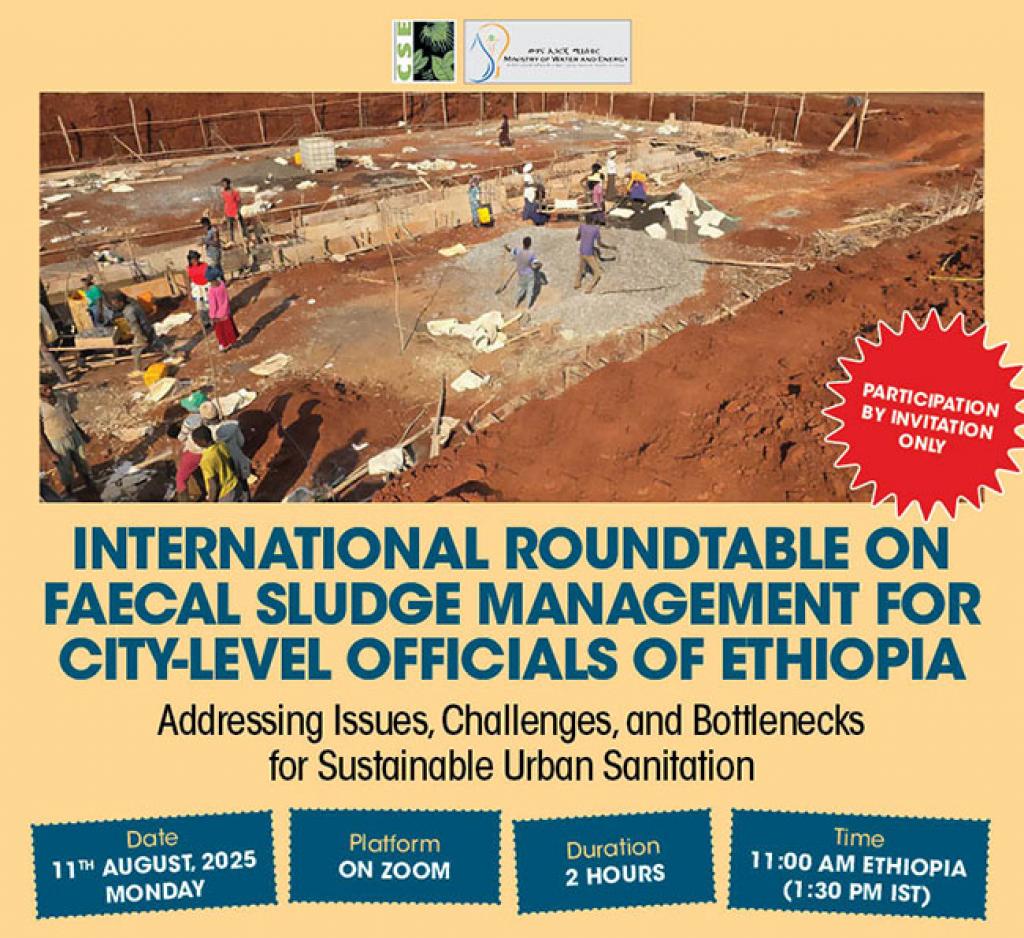International Roundtable for City-Level Officials in Ethiopia on Faecal Sludge Management
Background and Context
Ethiopia is experiencing rapid urbanization, leading to increased demand for essential urban services, particularly sanitation. While efforts are underway to improve access to basic sanitation, the comprehensive management of faecal sludge (FSM) remains a significant challenge in many cities. Effective FSM is crucial not only for safeguarding public health and protecting the environment from pollution but also for achieving sustainable urban development goals.
Ethiopia has started making remarkable strides in sanitation by actively planning, designing, and implementing critical infrastructure while shaping policies to improve the country’s overall sanitation landscape. Currently 23 FSTPs are under construction under World Bank funding, 6 other cities are constructing FSTPs under Italian Water Development funding. Besides it, the World Bank is also planning to expand FSTP infrastructure to other 24 cities in the next phase.
As of the May 2025 report from MoWE, the Faecal Sludge Treatment Plant (FSTP) construction status across various towns in the World Bank sanitation project shows mixed progress.
Overall, while some towns are well into construction, a notable portion is still in early stages or stalled due to various pre-construction and administrative challenges.
These issues range from technical and financial constraints to institutional weaknesses and social acceptance issues. There is a critical need for a dedicated platform where city officials can collectively discuss their on-ground experiences, identify common obstacles, and brainstorm practical, context-specific solutions.
Objectives
The primary objectives of this roundtable are to:
- Identify Key Challenges: Systematically identify and articulate the major issues, challenges, and bottlenecks encountered in the planning, implementation, operation, and maintenance of Faecal Sludge Management (FSM) projects at the city level in Ethiopia.
- Facilitate Knowledge Exchange: Create a platform for city officials to share their practical experiences, lessons learned, and innovative approaches in FSM.
- Propose Solutions: Brainstorm and collectively propose actionable solutions and strategies to overcome the identified challenges, fostering peer learning and collaborative problem-solving.
- Inform Future Interventions: Generate insights and recommendations that can inform national and local FSM policies, investment priorities, and capacity-building initiatives in Ethiopia.
- Creation of Forum of Cities managing septage: To facilitate future interactions through regular convening and exchange of ideas.
Proposed Format and Methodology
This will be an intensive two hours roundtable discussion, designed for maximum interaction and practical outcomes. It will be conducted on Zoom. The methodology will include:
- Brief Overview Presentations: Short, concise presentation to set the context, outlining the national FSM landscape and common challenges.
- A case study from Uttar Pradesh- Issues and challenges in operationalization of FSTPs
- Facilitated Group Discussions: Participants will be divided into smaller groups to delve into specific thematic areas of FSM challenges (e.g., technical, financial, institutional, social). Each group will identify bottlenecks and propose solutions.
- Plenary Sessions: Group findings will be presented and discussed in a plenary, fostering cross-learning and a shared understanding of common issues.
- Interactive Q&A and Open Dialogue: Ample opportunity for participants to raise questions, share experiences, and engage in open discussions.
- Prioritization Exercise: A concluding session to prioritize the most pressing challenges and promising solutions identified.
Workshop Coordinator, Ministry of Water and Energy, Ethiopia
Raji Kifle
Water and Sanitation Engineer
Urban Sanitation Infrastructure Study
Design and Construction Supervision Desk
Ministry of Water and Energy, Ethiopia
Email: rajikifle17@gmail.com
Workshop Coordinator, Centre for Science and Environment, India
Sarim A
Deputy Programme Manager
Water Programme
Centre for Science and Environment, Delhi, India
Email: sarim.a@cseindia.org
| Meeting recording |
| Agenda |
| Download pdf |
| Presentations |
| International Roundtable for City-Level Officials in Ethiopia on Faecal Sludge Management |
| FAECAL SLUDGE AND SEPTAGE MANAGEMENT (FSSM) IN UTTAR PRADESH, INDIA By: SARIM, CSE |
| Flyer |
 |
| Download flyer |
| Aim |
| This City-Level Roundtable aims to facilitate such a dialogue, drawing out key insights from those directly involved in FSM project implementation to inform future strategies and interventions for accelerating the FSM progress in Ethiopia. |
| Target audience |
The roundtable will convene key stakeholders directly involved in urban sanitation and FSM from various Ethiopian cities. This includes:
|
| ORGANIZERS AND FACILITATORS The roundtable will be organized and facilitated by Centre for Science and Environment (CSE) in collaboration with Ministry of Water and Energy, Ethiopia. |
Share this article